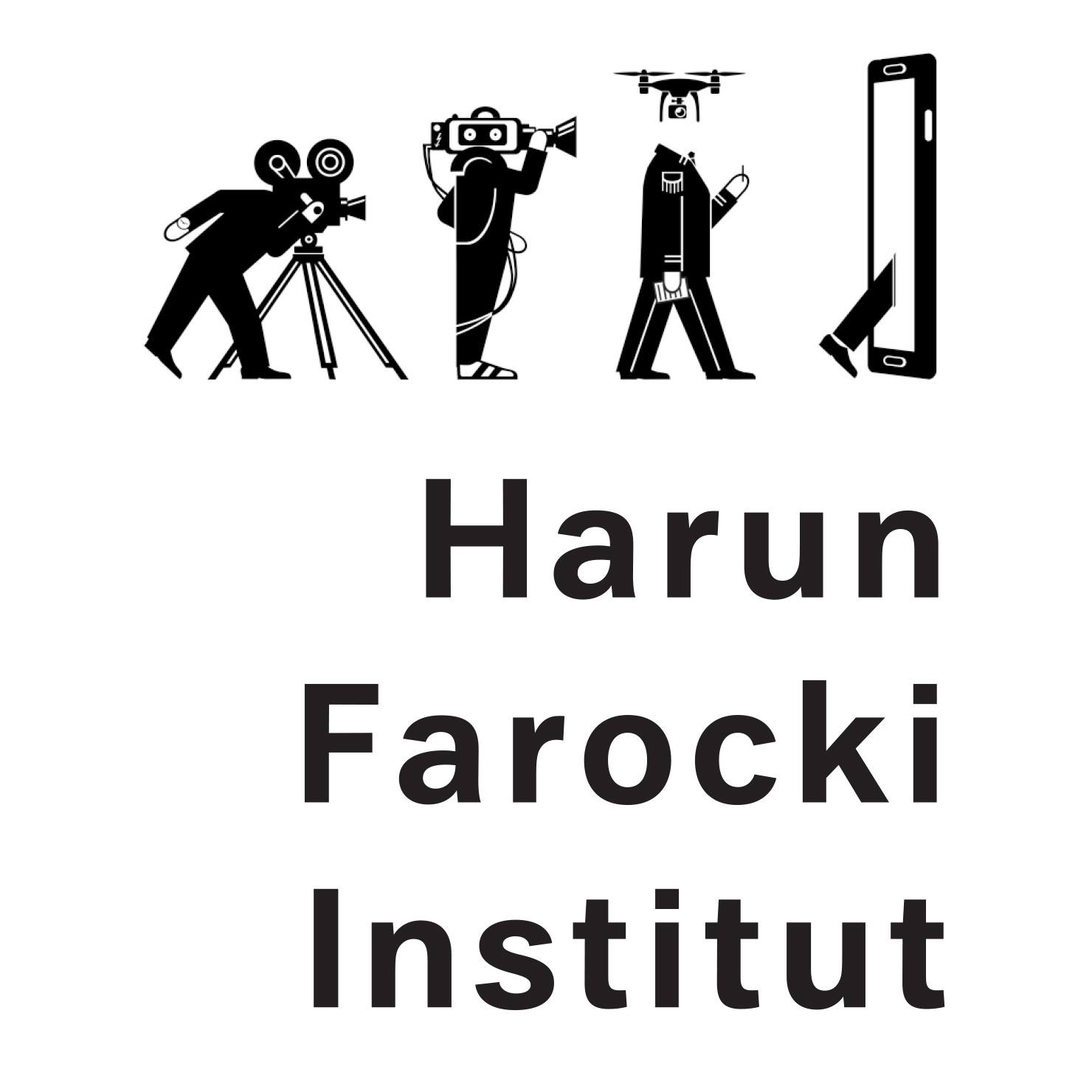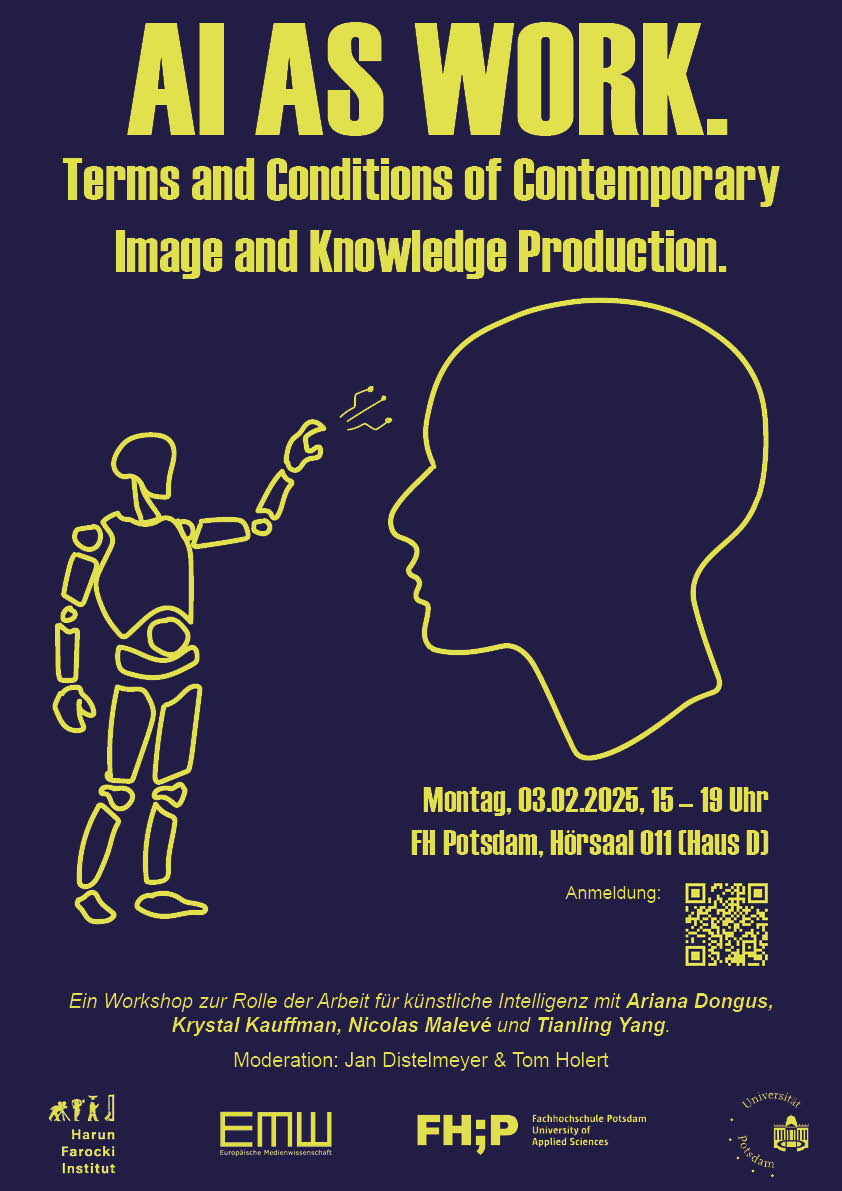 | ||
| ||
 | ||
| ||
 | ||
| ||
 | ||
| ||
A workshop on the role of work for artificial intelligence with Ariana Dongus, Krystal Kauffman, Nicolas Malevé and Tianling Yang – organized together with the Harun Farocki Institut, Berlin
03. Februar 2025, 15:00 – 19:00 (followed by reception in the foyer, please register)
University of Applied Sciences Potsdam, Hörsaal 011 (Haus D)
The rapidly increasing presence and use of generative AI since the end of 2022 – epitomized in platforms such as ChatGPT, Stable Diffusion etc. – raises a number of questions. These include not only the widely known (optimistic or worrying) projections about the beneficial use of AI in research, the alleged “end of truth” or an expected “end of work”. What’s more, such prognostics are directly linked to developments that affect current labor – for and with AI. In contrast to the idea of purely machine-based systems, human work is an essential agency and prerequisite of virtually every manifestation of contemporary AI: the human labor of data workers (labeling huge amounts of data for the “learning” machines) as well as the creation of the textual and visual content to be captured and crawled on the internet (to become the basis of human-led learning as data).
For both forms of human agency, implicated in a supposedly artificial and autonomous technology as they are, the question of legitimacy arises. Years of exploiting human (pre-)labor for automated artificial intelligence processes don’t legitimize such extractive practice. Far from it, they instead demand critical incursions by legal advocacy and scholarship that pertain to labor law and intellectual property legislation. By necessity, the conditions of AI’s production and its terms have to be brought to the fore with as much clarity as possible.
The working conditions of data workers, who are scattered all over the world, poorly paid and – due to labeling and filtering out violent and disturbing content – mentally burdened, need to be scrutinized and improved. Also, the copyright on the data used (not only, but especially for the work of artists) has to be adressed. It's always about masses – about enormous amounts of data processed by the huge number of data workers, which the World Bank currently estimates at between 150 and 430 million. Both aspects therefore illustrate the importance of the production and use of (big) data for this new form of technology. They help with today's urgent task of understanding how artificial intelligence works.
Initiatives such as the 2023 Content Moderators Manifesto, the collective research project Data Workers’ Inquiry launched in Summer 2024 and the ongoing lawsuits filed by authors, screenwriters and publishers against Open AI and Microsoft are important steps. They provoke further questions such as what can become data at all, where new data comes from, who has the authority to interpret the data and how, and what role the users of platforms such as ChatGPT, Stable Diffusion and many more play in this.
The workshop “AI as Work. Terms and Conditions of Contemporary Image and Knowledge Production” will bring into conversation researchers, practitioners and activists Ariana Dongus, Krystal Kauffman, Nicolas Malevé and Tianling Yang. With the following impulses:
Krystal Kauffman:
The Data Workers behind AI: Exploitation in the Industry and how to Prevent it
Ariana Dongus:
Always in Beta? AI, Data, and Labor in Experimental Economies of Exclusion
Nicolas Malevé:
The Vagaries of the Artistic Class in Generative AI
Precisely because the infrastructures and concrete functionalities of AI are often hidden, abstract and not easy to understand, the focus of this gathering will be on discussions with all participants.
The workshop is part of the project “Terms and Conditions. The Legal Form of Images” and a collaboration of the Media Studies program (EMW) at the University of Applied Sciences Potsdam and University of Potsdam with the Harun Farocki Institut (HaFI), Berlin, and the Academy of Visual Arts, Leipzig.
Where: University of Applied Sciences Potsdam, Hörsaal 011 (Haus D), Kiepenheuerallee 5, 14469 Potsdam
When: 03.02.2024, 15:00 – 19:00
Admission is free, please register at
Organizers: Jan Distelmeyer & Andreas Scherffig (EMW), Elsa de Seynes & Tom Holert (HaFI) | ||
A workshop on the impact, costs and futures of artificial intelligence with Mophat Okinyi, Raghavendra Selvan and Katrin Fritsch – organized together with the Alexander von Humboldt Institute for Internet and Society (HIIG)
29 October 2025 • 14:00 – 18:00
Alexander von Humboldt Institute for Internet and Society (HIIG) AI technologies have sparked ongoing hype and public attention. It seems that almost no week goes by without news about AI supposedly mastering a new task, solving a serious problem or outperforming a human. However, this publicity and the discourse surrounding it are dominated by the firms that invest in and design these systems, and which therefore depend on a glorified public perception of AI systems and their impact on our societies. Other voices, especially critical ones from research and civil society, are underrepresented in the public debate. While AI ‘innovation’ is omnipresent, it tells a very one-sided story at the very least. Many realities about AI industries, the processes of AI development, and the costs and impacts they create for societies and the planet are left out and remain underresearched and funded.
In this collaborative workshop we will spotlight different perspectives on AI that often remain hidden. We will explore the perspectives of data workers’ collectives who invest the human labour that forms the basis of AI technology. We will discuss the resource costs and extraction mechanisms that underpin the growth of the AI industry, including water, energy, emissions, raw materials and the waste that AI technologies generate. We will also explore how an intersectional feminist perspective can highlight the injustices produced by AI developments and articulate the hidden costs on society.
Our three distinguished speakers, Mophat Okinyi (CEO Techworkers Community Afrika), Raghavendra Selvan (Assistant Professor at the University of Copenhagen, Machine Learning Section) and Katrin Fritsch (Green Web Foundation), will engage in a discussion outlining and debating the commonalities and tensions of the issues surrounding the growing AI industry. Participants are invited to take part in an intensive half-day workshop involving short presentations from our guests and room for open debate, with the aim of identifying shared problem descriptions, common goals, and potential courses of action.
Mophat Okinyi is founder & CEO of Techworker Community Africa (TCA). As AI and human rights activist, his primary focus lies in advocating for the fair treatment and rights of online content moderators, tech workers and data training professionals.
Raghavendra Selvan is an Assistant Professor at the Machine Learning (ML) Section, Dept. of Computer Science, University of Copenhagen (UCPH). His current research interests are broadly pertaining Resource Efficient ML, ML for Sciences, and Graph Neural Networks. He is also interested in the intersection of sustainability and ML where he investigates sustainability with ML, and also the sustainability of ML.
Katrin Fritsch is a freelance writer on technology, environment, and feminism, as well as a Senior Program Manager at Green Web Foundation. She also advises organisations on data, justice, sustainability, and emerging technologies. Previously, she was chair of epicenter.works and co-founded and co-led MOTIF: a think tank working towards social justice in the digital age. Katrin is also a co-initiator of the art project Feminist Futures.
Where: Alexander von Humboldt Institute for Internet and Society (HIIG), Französische Str. 9, 10117 Berlin
When: 29 October 2025 • 14:00 – 18:00
Admission is free, please register by October 27 via the event website.
https://www.hiig.de/en/events/omnipresent-hidden-impact-costs-and-futures-of-ai/
Organizers: Theresa Züger (HIIG) & Jan Distelmeyer (EMW) | ||
 | ||

.jpg)

.png)
.jpeg)
.jpg)